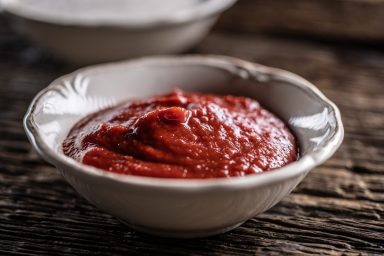Although dogs can eat ketchup in small amounts without needing a trip to the emergency vet, they really shouldn’t. Most ketchup brands contain garlic or onion powder, which is toxic to dogs. An accidental lick or two usually won’t hurt them, but it’s better just to steer clear of sharing ketchup altogether.
As always, you must ask your regular vet before going ahead and sharing any human food with your beloved pooch, including ketchup. Here’s what you need to know about ketchup and dogs.
if ( document.querySelector(‘.xe-gallery’) == null ){
var viStyle = document.createElement(‘style’);
viStyle.id = “viPlayerStyle”;
viStyle.innerHTML = “#viPlayer-P{ display: initial !important; } .vi-stories-parent-div{ text-align: center; }”;
document.head.appendChild(viStyle);
(function (v,i) {
var scp = v.createElement(“script”),
config = {
ChannelID: ‘0nqr3w5ff’,
AdUnitType: ‘2’,
PublisherID: ‘256607409443141’,
PlacementID: ‘pltU2JIgmaTXI9XW18z’,
DivID: ”,
IAB_Category: ‘IAB1’,
Keywords: ”,
Language: ‘en-us’,
BG_Color: ”,
Text_Color: ”,
Font: ”,
FontSize: ”,
};
scp.src=’https://s.vi-serve.com/tagLoader.js’;
scp.type = “text/javascript”;
scp.async = true;
scp.onload = function() {
i[btoa(‘video intelligence start’)].init(config);
};
(v.getElementsByTagName(‘head’)[0] || v.documentElement.appendChild(v.createElement(‘head’))).appendChild(scp);
})(document, window);
}
Advertisement
When is ketchup okay for my dog to eat?
The main ingredient in most ketchups is tomatoes, and ripe tomatoes without leaves or stems are not toxic to dogs. While tomatoes should not form the majority of your dog’s diet, you can occasionally give your dog a bite as a snack or a treat.
So when it comes to a dog who sneaks in a lick or two of ketchup, they should hopefully be fine and not suffer from any adverse reactions. Steer clear of sharing any ketchup that includes garlic or onion powder.
@media (min-width: 0px) and (max-width: 749px) { .pb_prebidjs_300x250_p__wrapper { display: none; } } @media (min-width: 750px) { .pb_prebidjs_300x250_p__wrapper { min-height: 250px; } }
var admiral_status = window.admiral_status || undefined;
if (typeof readAdmiralCookie === “function”) {
admiral_status = readAdmiralCookie();
}
if (typeof getAdmiral === “function”) {
admiral_status = getAdmiral(“admiral_status”);
}
if (‘undefined’ === typeof admiral_status || true !== admiral_status) {
var PB = PB || {};
PB.gptStandAlone = PB.gptStandAlone || {};
PB.gptAutoRefresh = PB.gptAutoRefresh || {‘gptAds’: [], ‘gptStandAlone’: []};
googletag.cmd.push(function () {
var standAloneSizeMapping = googletag.sizeMapping().addSize([0, 0], []).addSize([750, 0], [[300, 250]]).addSize([980, 0], [[300, 250]]).build(); PB.gptStandAlone[‘pb_prebidjs_300x250_p’] = googletag.defineSlot(‘/4403/th/dogtime/doghealth’, [[300, 250]], ‘pb_prebidjs_300x250_p’)
.defineSizeMapping(standAloneSizeMapping) .addService(googletag.pubads())
.setTargeting(‘pos’, ‘P’).setTargeting(‘ct’, ‘article’).setTargeting(‘ci’, ‘90614’).setTargeting(‘content_detail’, ‘1’).setTargeting(‘kw’, ‘can-dogs-eat,cover-panel,dog-food-dog-nutrition,evergreen,exclude_from_yahoo,human-food,ketchup,in-article’).setTargeting(‘coppa’, ‘0’).setTargeting(‘site’, ‘dogtime’);
googletag.enableServices();
});
if ( amazon_uam == true ){
amznSlots.push( {
slotID: ‘pb_prebidjs_300x250_p’,
slotName: ‘/4403/th/dogtime/doghealth’,
sizes: [[300, 250]] } );
}
}
@media (min-width: 0px) and (max-width: 749px) { .pb_prebidjs_300x250_a__wrapper { min-height: 250px; } } @media (min-width: 750px) { .pb_prebidjs_300x250_a__wrapper { display: none; } }
var admiral_status = window.admiral_status || undefined;
if (typeof readAdmiralCookie === “function”) {
admiral_status = readAdmiralCookie();
}
if (typeof getAdmiral === “function”) {
admiral_status = getAdmiral(“admiral_status”);
}
if (‘undefined’ === typeof admiral_status || true !== admiral_status) {
var PB = PB || {};
PB.gptStandAlone = PB.gptStandAlone || {};
PB.gptAutoRefresh = PB.gptAutoRefresh || {‘gptAds’: [], ‘gptStandAlone’: []};
googletag.cmd.push(function () {
var standAloneSizeMapping = googletag.sizeMapping().addSize([0, 0], [[300, 250]]).addSize([750, 0], []).addSize([980, 0], []).build(); PB.gptStandAlone[‘pb_prebidjs_300x250_a’] = googletag.defineSlot(‘/4403/th/dogtime/doghealth’, [[300, 250]], ‘pb_prebidjs_300x250_a’)
.defineSizeMapping(standAloneSizeMapping) .addService(googletag.pubads())
.setTargeting(‘pos’, ‘A’).setTargeting(‘ct’, ‘article’).setTargeting(‘ci’, ‘90614’).setTargeting(‘content_detail’, ‘1’).setTargeting(‘kw’, ‘can-dogs-eat,cover-panel,dog-food-dog-nutrition,evergreen,exclude_from_yahoo,human-food,ketchup,in-article-mobile’).setTargeting(‘coppa’, ‘0’).setTargeting(‘site’, ‘dogtime’);
googletag.enableServices();
});
if ( amazon_uam == true ){
amznSlots.push( {
slotID: ‘pb_prebidjs_300x250_a’,
slotName: ‘/4403/th/dogtime/doghealth’,
sizes: [[300, 250]] } );
}
}
If you have a hard time resisting sharing nibbles with your dog, you might want to stock a natural ketchup that does not include garlic, onion powder, or added sugars.
When is ketchup bad for dogs?
While tomatoes are the main ingredient in most ketchups, commercial brands usually also contain both garlic powder and onion powder. These two ingredients are not good for dogs.
In the case of onion powder, certain compounds in the ingredient can harm a dog’s red blood cells. In turn, this could cause a dog to suffer from anemia.
When it comes to garlic powder, this is equally as dangerous for dogs when it comes to its negative impact on red blood cells.
Additionally, most commercial ketchups contain high levels of sugar and sodium, which is not something you want to get into the habit of feeding to your canine.
If you notice that your dog has managed to eat a significant amount of ketchup, you should monitor the situation closely and keep an eye out for possible symptoms. Some of the most common symptoms of a dog eating too much ketchup include:
- Acting lethargic
- Losing their appetite
- Seeming weaker than usual
- Urine that looks red
If you notice that your dog seems to be showing significant symptoms after eating ketchup, make sure to consult your regular veterinarian straight away.




